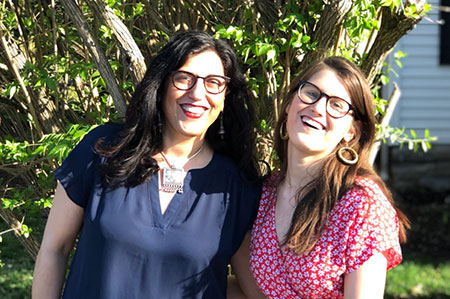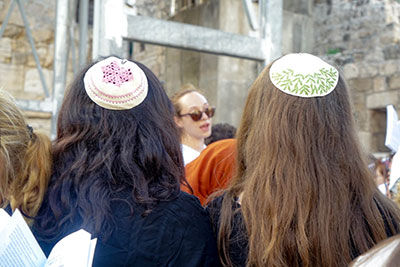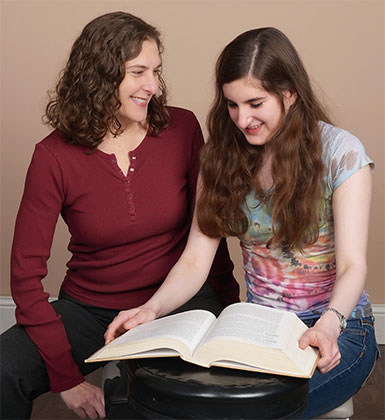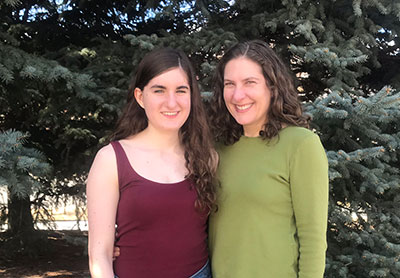Family
Feature
Pride and Hope in Their Daughters’ Generation
In this time of social distancing, when so many are being forced apart while simultaneously spending more time at home and with family than usual, Hadassah Magazine is delighted to bring you these snapshots of mother-daughter dialogue, produced in collaboration with jGirls Magazine. We hope these interviews—and those featured in the related posts, Mothers and Their Teen Daughters, in Conversation and Empowering Their Daughters to Change the World—inspire you toward similarly fruitful, relationship-expanding discussions with the girls and women in your life, across generations.

PARTNERS WORKING FOR CHANGE
Emanuelle Sippy, 16, is a junior at the Liberal Arts Academy at Henry Clay High School in Lexington, Ky. Her mother, Shana Sippy, is a professor of religion at Centre College.
WHAT MAKES YOU MOST AFRAID AND WHAT MAKES YOU MOST HOPEFUL IN THINKING ABOUT THE FUTURE?
Emanuelle: My hopes and fears are inextricably connected. I worry about our world, where change is so incremental, but I also wonder if our conception of a revolution to combat systemic inequity is too narrow, especially regarding schools. The language of destroying the system doesn’t get us anywhere. A revolution could be a recognition of educator and student needs as mutual interests; a reckoning with the ways in which our schools are still segregated 65 years after Brown v. the Board of Education; a cultural shift around sexual harassment; a learning environment predicated upon critical thinking rather than memorization and regurgitation. The intergenerational intention, action and collective reckoning that we’re a part of in this moment makes me hopeful.
Shana: I had hoped we would give your generation a brighter future but, instead, it feels like we have bequeathed you a world that needs fixing. Obviously, we have to be your partners in working to change things. The climate crisis, racism, fascism, white supremacy and misogyny all continue to plague us, and, in many ways, they seem to be getting worse. There clearly needs to be a radical shift if we are going to make change, and that is where my hope comes in. You and your peers are so inspiring. Nothing seems too great for you to take on—whether it is the teach-ins and rallies you plan, the bills you work on in the Kentucky Legislature or your work on education inequity. You and your brother are my greatest hope.
WHAT IS SOMETHING YOU WISH YOU COULD HAVE TOLD ME, BUT NEVER HAD THE CHANCE? IS THERE A QUESTION I NEVER ASKED YOU THAT YOU WISH I HAD?
Emanuelle: I wish I asked you more about my great-grandmothers. I think about your Bubbe’s rolling pin, which you use when we make hamantaschen, and the recipes—plum torte and matzah balls—that we make for holidays. But I would like to know more. I also wish I knew more about your Grandma Sati, who was not Jewish, and what her life was like growing up in Sindh, in what is today Pakistan.
Shana: There are so many things I would love to tell you about your maternal great-grandmothers. You don’t remember, but Grandma Bea—my Bubbe—met you. And I was pregnant with you when Grandma Sati, my other grandmother, died. They both lived into their 90s. I think the memory I most want to share is about shopping at Loehmann’s with Grandma Bea and my mom—whom you call Nani—in New Jersey. Suffice it to say, I got quite an education seeing all these women, of all different shapes and sizes, including my grandmother, undress in the big dressing room. At the age of 7, it felt a little traumatic, but I learned so much from it. It gave me a healthy sense of how varied women’s bodies could be.
As far as Grandma Sati, she was a fabulous woman. You’ve seen the pictures—she seems like a traditional Hindu widow. She wore white from the time my grandfather died at the age of 45 until her death more than 45 years later. But she wasn’t so traditional. She loved my mom, they always stayed close. She came from India for my bat mitzvah and was so proud of all I had learned. She loved chocolate, too, even though she was pre-diabetic. She was mischievous and would sneak her favorite sweets into her room because she felt like life was just too short not to have a few simple pleasures.

HOW HAVE JEWISH COMMUNITIES PROVIDED YOU WITH COMFORT AND HOW HAVE THEY CHALLENGED YOU?
Shana: Universally, I would say that Jewish communities—from Berkeley, Calif., to ones in New York, Minneapolis and Lexington—have reliably been places where I have found friendship, connected with people from different generations and backgrounds. They have also been places of tsuris. I have seen and felt that acutely, not only as a Reform rabbi’s wife, but also as an activist, a student and a professor of comparative religion and women and gender studies. It seems as though the divides are only getting greater today. I see the ways in which issues of politics and class are dividing Jews, especially along generational lines.
To me, the biggest challenge today involves how we talk and think about contentious issues. We have historically been strong advocates of free speech. There is a new kind of anti-intellectualism that is rearing its head in the Jewish community, largely born out of real fears, especially anti-Semitism. But when I hear Jewish community leaders and educators calling to silence people who might be critical of Israel, refusing to engage in dialogue with those who profess different views than they do, I recoil. Engagement and study with others, especially those with whom you may disagree, is the best way to learn.
I recently had the most powerful teaching experience of my life taking 30 Centre College students on a trip to Israel and the Palestinian territories with an Islamic Studies colleague. We heard and saw things that I never would have seen had I stayed in a safe and carefully curated Jewish bubble, and it makes me a better Jew and a better person.
Emanuelle: There is so much valid fear about anti-Semitism, but the fear sometimes seems to supersede enacting Jewish values like welcoming the stranger, loving our neighbors and tikkun olam. Our fear, our anger, our despair should push us to open more doors, be even more cognizant of others. I’m thinking about how Jews of color often feel, how friends who see the Israeli-Palestinian conflict differently, have taught me so much. I’m thinking about the fact that progressive Jews, and particularly progressive Jewish women, have limited rights in Israel, like we experienced at the Kotel when we joined the Women of the Wall last summer. But as defeated as I felt in that moment—when state-sponsored sinat chinam (baseless hatred) and sexism were leveled at us by women who recite the same prayers that we do, who enact the same rituals as us, but who embody the antithesis of our Jewish values—I’d never been so proud of being a progressive Jew. And I still am.

A SHARED LOVE OF WORDS AND LANGUAGE
Aydia Mayan Caplan, 17, is a junior at George Washington High School in Denver, Colo. Her mother, Eliana Caplan, is a yoga instructor, combining her background in Jewish studies and Anusara yoga.
Have you ever felt empowered by Judaism? Have you felt that you weren’t heard because of Judaism?
Eliana: When I was growing up in Oklahoma, there was a lot of anti-Semitism. In elementary school, kids would sing on the playground that I didn’t believe in God, and sometimes even ask to see my horns. The gestalt of this and other childhood experiences left me feeling marginalized, and sometimes even victimized because of my Judaism. I avoided other Jews even when I went to college on the East Coast.
After college, I found myself in a traveling theater company in small-town Pennsylvania. There was one other Jew in the company, and he enlisted me to celebrate Shabbat and holidays. I think of this man as my ish ba’sadeh, from Joseph’s story. This is the mysterious being that appears at pivotal times in our lives and points us in the right direction. Through him, I encountered Judaism for the first time as a source of wisdom, beauty and connection, and ultimately chose to pursue a master’s degree in Jewish studies. Now I have a beautiful family with a strong Jewish identity, with a love of Jewish text and tradition, and even a synagogue community that functions as a positive force in our lives. So now, for me, Judaism is all about connection.
Aydia: I don’t think Judaism has ever held me back. I feel very fortunate that I was raised in a family that is so strongly connected to our Jewishness. We all have slightly differing interpretations of God and of what it means to be Jewish. For Dad, the most important part is the relationship with other Jews. For you, the relationship with God. I guess the concept of Judaism for me is closely interconnected with that of family. When I think of Judaism, I think of leading Kabbalat Shabbat and blessing the candles with you, my grandmother and my aunt. Of listening to my brother leining, singing and dancing at my cousins’ b’nei mitzvah and the marshmallow-hail showers at our hectic family seders.
What is one thing you value about yourself, and one thing you would change if you could?
Aydia: I value my ability to work hard. I pour 100 percent of my effort into everything, which in some ways is not ideal. I’ll spend hours working on optional assignments for a class that I already have an “A” in, or I’ll take on the brunt of a group project even when others are perfectly willing to do the work. And it’s not just with school: In eighth grade, when one of my friends was going through a difficult time, I poured everything into trying to help her, even when she was pushing me away and it was clear that our friendship wasn’t going to last. I kept it up even as it started dragging me into a—really, a place of depression.
And then, I would love to be happier about my body. I’m sure a lot of teenage girls—and a lot of people—would think of that. I’m no different.
Eliana: I value my compassionate nature, even though sometimes it has made things difficult. I can be that “sponge.” In my freshman year at Yale, there was a strike of the dining and housekeeping workers, and the students were collectively under a ton of extra stress. I tried to help everyone else without setting my own boundaries. I ended up sick in the hospital and unable to finish out the semester. But this compassion is also the source of my intuition and the root of my desire to help others. It’s what has led me to teach yoga and offer therapeutics.
As far as something that I would change about myself, it’s kind of the inverse of yours, that I more fully embrace hard work and the willingness to experience new things. I guess it really comes down to operating less out of fear.
What are ways in which we are similar and ways in which we are different?
Aydia: We think in frighteningly similar ways and have identical interests. You gave me my love of Shakespeare, of theater, of writing poetry. I think that the biggest difference is honestly not in personality, but rather in life experience. You grew up with far fewer opportunities and in a place that was less accepting of your identity. I think that maybe changed you. Whereas I’ve grown up with more opportunities and in a far more accepting place. I’ve been able to participate in theater and speech and debate and be completely overt about my passion for school and knowledge without worrying about getting bullied. So, while we both really connect with performing arts, that seems to have come from a place of rebellion for you and not so much for me. Also, it’s been easy for me to find a supportive Jewish community. I think that has affected me.
 Eliana: Meaning, shaped you in a different way?
Eliana: Meaning, shaped you in a different way?
Aydia: Yeah. It seems to me the differences between us are mostly a reflection of the opportunities that were denied to you when you were my age, but that you and Dad are now able to provide for me. It’s bittersweet.
Eliana: One of my favorite ways that we’re similar is our shared love of nerdiness around words and language. I think we’re both kind of intellectual snobs.
Aydia: Geeks.
Eliana: Yeah! And then we’re similar physically. A lot of people say, “It’s really obvious that you guys are related!” And I agree. A lot of the ways we’re different have to do with our different upbringings, so it’s hard to weed out the “whys.” I think we’d both say we’re introverts, but I’ve tended to be much more comfortable with one close friend at a time and feel really awkward in groups of people. You have groups of friends that you navigate really well within and have a lot of social ease and grace in that context.
I see a lot of strength in the way you take a full bite of the world—you’re willing to be strong and effortful, even at the physical level with your love of weightlifting and your intelligence and tendency to be the first to volunteer. My strength and intensity are there, too, but I think at least on the surface I’m a bit softer in lots of ways.
These interviews, as well as those shared in Mothers and Their Teen Daughters, in Conversation and Empowering Their Daughters to Change the World, were a joint project with jGirls Magazine and are also featured in the cover story of Hadassah Magazine’s May/June 2020 print edition.










 Facebook
Facebook Instagram
Instagram Twitter
Twitter
Leave a Reply